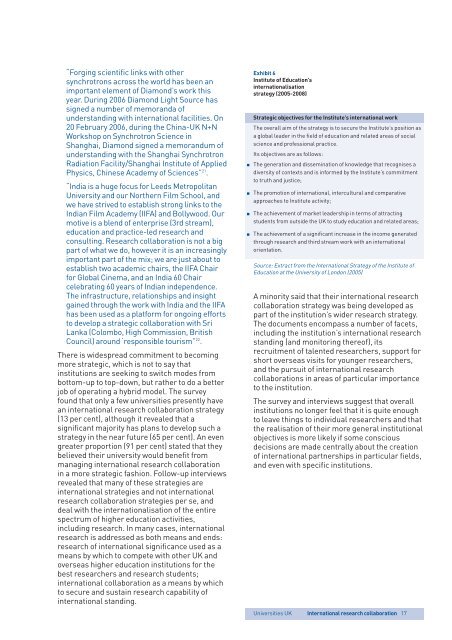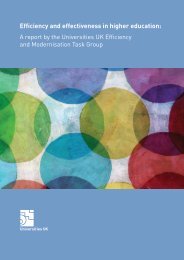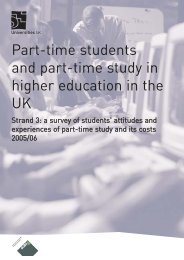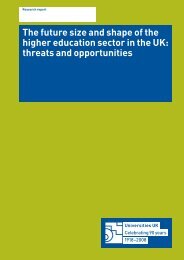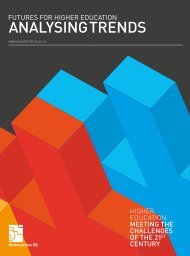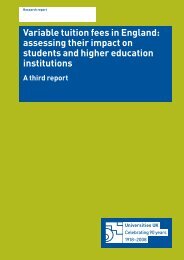International Research Collaboration - GlobalHigherEd
International Research Collaboration - GlobalHigherEd
International Research Collaboration - GlobalHigherEd
Create successful ePaper yourself
Turn your PDF publications into a flip-book with our unique Google optimized e-Paper software.
“Forging scientific links with othersynchrotrons across the world has been animportant element of Diamond’s work thisyear. During 2006 Diamond Light Source hassigned a number of memoranda ofunderstanding with international facilities. On20 February 2006, during the China-UK N+NWorkshop on Synchrotron Science inShanghai, Diamond signed a memorandum ofunderstanding with the Shanghai SynchrotronRadiation Facility/Shanghai Institute of AppliedPhysics, Chinese Academy of Sciences” 21 .“India is a huge focus for Leeds MetropolitanUniversity and our Northern Film School, andwe have strived to establish strong links to theIndian Film Academy (IIFA) and Bollywood. Ourmotive is a blend of enterprise (3rd stream),education and practice-led research andconsulting. <strong>Research</strong> collaboration is not a bigpart of what we do, however it is an increasinglyimportant part of the mix; we are just about toestablish two academic chairs, the IIFA Chairfor Global Cinema, and an India 60 Chaircelebrating 60 years of Indian independence.The infrastructure, relationships and insightgained through the work with India and the IIFAhas been used as a platform for ongoing effortsto develop a strategic collaboration with SriLanka (Colombo, High Commission, BritishCouncil) around ‘responsible tourism” 22 .There is widespread commitment to becomingmore strategic, which is not to say thatinstitutions are seeking to switch modes frombottom-up to top-down, but rather to do a betterjob of operating a hybrid model. The surveyfound that only a few universities presently havean international research collaboration strategy(13 per cent), although it revealed that asignificant majority has plans to develop such astrategy in the near future (65 per cent). An evengreater proportion (91 per cent) stated that theybelieved their university would benefit frommanaging international research collaborationin a more strategic fashion. Follow-up interviewsrevealed that many of these strategies areinternational strategies and not internationalresearch collaboration strategies per se, anddeal with the internationalisation of the entirespectrum of higher education activities,including research. In many cases, internationalresearch is addressed as both means and ends:research of international significance used as ameans by which to compete with other UK andoverseas higher education institutions for thebest researchers and research students;international collaboration as a means by whichto secure and sustain research capability ofinternational standing.Exhibit 6Institute of Education’sinternationalisationstrategy (2005-2008)Strategic objectives for the Institute’s international workThe overall aim of the strategy is to secure the Institute’s position asa global leader in the field of education and related areas of socialscience and professional practice.Its objectives are as follows:p The generation and dissemination of knowledge that recognises adiversity of contexts and is informed by the Institute’s commitmentto truth and justice;p The promotion of international, intercultural and comparativeapproaches to Institute activity;p The achievement of market leadership in terms of attractingstudents from outside the UK to study education and related areas;p The achievement of a significant increase in the income generatedthrough research and third stream work with an internationalorientation.Source: Extract from the <strong>International</strong> Strategy of the Institute ofEducation at the University of London (2005)A minority said that their international researchcollaboration strategy was being developed aspart of the institution’s wider research strategy.The documents encompass a number of facets,including the institution’s international researchstanding (and monitoring thereof), itsrecruitment of talented researchers, support forshort overseas visits for younger researchers,and the pursuit of international researchcollaborations in areas of particular importanceto the institution.The survey and interviews suggest that overallinstitutions no longer feel that it is quite enoughto leave things to individual researchers and thatthe realisation of their more general institutionalobjectives is more likely if some consciousdecisions are made centrally about the creationof international partnerships in particular fields,and even with specific institutions.Universities UK<strong>International</strong> research collaboration 17


